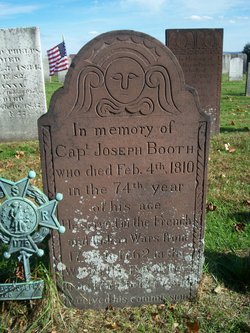Independence Booth in the New Nation
Toward the end of 1778, when Independence Booth was two years old, her parents had a little girl named Hannah. She was their ninth and last child; mother Mary Booth was then forty-five years old.
It looks like Joseph Booth was home for the rest of the Revolutionary War, though his neighbors in Enfield, Connecticut, would continue to call him “Captain Booth” as a courtesy for the rest of his life.
Independence Booth grew up in Enfield and married a man named Danforth Charles in 1802. He appears to have been born in Brimfield, Massachusetts, in 1779. Their first child was a boy named Henry, born in September 1803 but dying thirteen months later. In 1805 they had another boy, whom they also named Henry.
In late 1806, the couple conceived a third child. But in January 1807, Danforth Charles died. Independence gave birth in June to a girl she named Hannah. The widow still had her parents and most of her siblings nearby for support, though Mary and Joseph Booth died in 1809 and 1810, respectively.
In 1817 Independence Charles was listed as an inhabitant of Springfield, Massachusetts, when she married Lewis Barber of Ludlow there. That marriage was newsworthy enough to be reported in the Franklin Herald of Greenfield. Three years later, the Enfield church dismissed “Widow Independence Charles” to the congregation at Ludlow; she and her children had probably already made the move.
In 1828 Independence (Booth Charles) Barber died in Ludlow, survived by her third husband and her two children, then in their twenties. Courtesy of Revolution Happened Here, her gravestone in that town appears above, showing her birthdate as 4 July 1776. She had lived to see the fiftieth anniversary of the independence she was named after. Notably, the gravestone also includes her original surname.
The following year, daughter Hannah Charles married Elisha Taylor Parsons, a man from Enfield who had settled in Ludlow as a schoolteacher. He would become locally prominent as a deacon and town officeholder. Later Hannah’s older brother Henry married a woman named Nancy Parsons; I can’t confirm her family tie to Hannah’s husband. Both of Independence’s children had children of their own, passing on the story of how she was (almost) born on the 4th of July.
It looks like Joseph Booth was home for the rest of the Revolutionary War, though his neighbors in Enfield, Connecticut, would continue to call him “Captain Booth” as a courtesy for the rest of his life.
Independence Booth grew up in Enfield and married a man named Danforth Charles in 1802. He appears to have been born in Brimfield, Massachusetts, in 1779. Their first child was a boy named Henry, born in September 1803 but dying thirteen months later. In 1805 they had another boy, whom they also named Henry.
In late 1806, the couple conceived a third child. But in January 1807, Danforth Charles died. Independence gave birth in June to a girl she named Hannah. The widow still had her parents and most of her siblings nearby for support, though Mary and Joseph Booth died in 1809 and 1810, respectively.
In 1817 Independence Charles was listed as an inhabitant of Springfield, Massachusetts, when she married Lewis Barber of Ludlow there. That marriage was newsworthy enough to be reported in the Franklin Herald of Greenfield. Three years later, the Enfield church dismissed “Widow Independence Charles” to the congregation at Ludlow; she and her children had probably already made the move.
In 1828 Independence (Booth Charles) Barber died in Ludlow, survived by her third husband and her two children, then in their twenties. Courtesy of Revolution Happened Here, her gravestone in that town appears above, showing her birthdate as 4 July 1776. She had lived to see the fiftieth anniversary of the independence she was named after. Notably, the gravestone also includes her original surname.
The following year, daughter Hannah Charles married Elisha Taylor Parsons, a man from Enfield who had settled in Ludlow as a schoolteacher. He would become locally prominent as a deacon and town officeholder. Later Hannah’s older brother Henry married a woman named Nancy Parsons; I can’t confirm her family tie to Hannah’s husband. Both of Independence’s children had children of their own, passing on the story of how she was (almost) born on the 4th of July.



